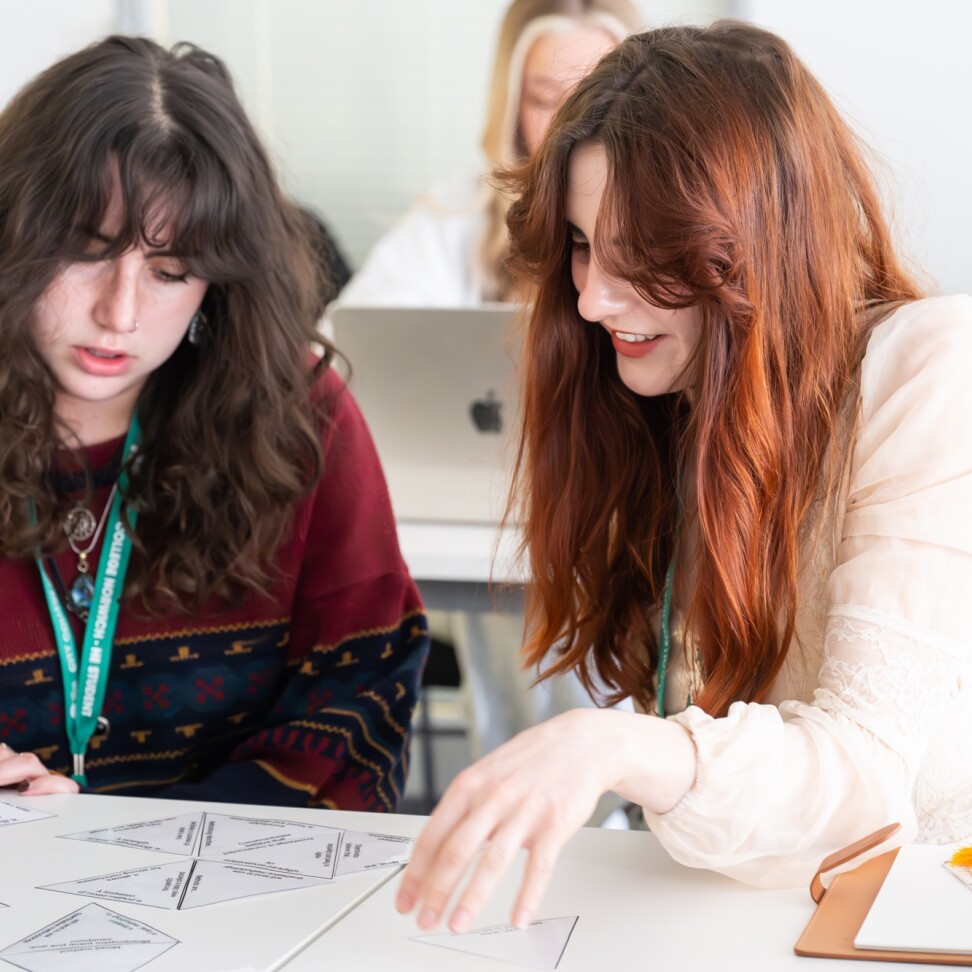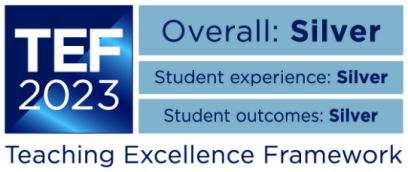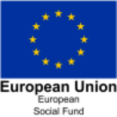BA (Hons) Childhood and Youth Studies

Choosing to study BA (Hons) Childhood and Youth Studies is a chance to make a real difference in the lives of children and young people.
If you are passionate about understanding how children and young people develop and how society, culture, and environments shape their experiences, this degree has a lot to offer you.
- Level
- 6
- Entry Point
- Sep 2026
- Duration
- Full Time, 3 years
- Venue
- Norfolk House campus
- UCAS Course Code
- L530
Reasons to study
this course
With a strong focus on both academic development and practical application, this BA (Hons) Childhood and Youth Studies degree equips you with the knowledge and skills to work in areas such as:
- Education
- Social work
- Mental health
- The third sector
- Early years practice
- Policy development
Successful completion of your degree also provides the level of qualification necessary to pursue post graduate study, such as Master’s programmes or Initial Teacher Training.
You will gain an in-depth understanding of child and youth development, along with sociological and cultural perspectives, while developing essential skills like critical thinking, research strategies, and problem-solving. Whether you aim to work directly with children or influence the systems that shape their lives, this degree will empower you to create positive change and support the holistic wellbeing of children and young people from conception to early adulthood.
Learning and teaching of this course takes place in Norfolk House, the home of City College Norwich Higher Education, which ensures you will have the space and resources to grow as an independent and reflective learner.

Abbie Toner - Course Leader BA (Hons) Childhood and Youth Studies
Hi, my name is Abbie and I have a varied background, predominately in social care, supporting children and young people in residential care. I have also acted as a parent support advisor for an Early Help Team in Suffolk and thereafter supported children and their families with various contextual safeguarding concerns, in schools.
In addition, I have worked in a front-line safeguarding team working with children at risk of child criminal exploitation and have spent time working for a charitable organisation that supports grandparents caring for their grandchildren due to addiction. Before coming into higher education teaching, I have supported young people and professionals affected by harmful sexual behaviour.
Contact course leaderWhere will this
course take you?
This BA (Hons) Childhood and Youth Studies degree can open the door to a wide variety of interesting and rewarding careers dedicated to supporting children and young people. Graduates of this programme are well-equipped to pursue a range of roles in education, social care and health settings, such as mentoring, family advocacy and learning support.
The degree also provides an excellent foundation for postgraduate study in diverse fields such as:
- MA in Social Work
- Speech and Language therapies
- PGCE/Initial Teacher Training
Additionally, our alumni have gone on to find opportunities within broader sectors such as the police force, probation services, alternative education provisions, the NHS, and charitable organisations.
Whether you aim to inspire through teaching, provide support to vulnerable families in challenging circumstances, or influence policy and practice, the BA in Childhood and Youth Studies equips you with the knowledge and skills to help you thrive in your chosen career.
Student stories
Course structure
This course is studied full time over three years. The programme is delivered over two days a week - 30 teaching weeks per year.
Modules
Level 4 modules
Professional and Academic Skills Compulsory
This module is designed to equip you for success in both your studies and future career. You will develop essential academic and professional skills, including in research, critical analysis, and effective communication. Through practical exercises, you will learn how to source and evaluate information, apply academic referencing, and present your ideas confidently across different media and forms of assessment.
You will also have the opportunity to reflect on your own growth, identifying ways to enhance your learning and employability. Whether working individually or collaborating with peers, this module helps you build a strong foundation for academic achievement and professional excellence.
Assessment:
-
Reflective Journal (70% of module weighting)
-
Group Presentation (30% of module weighting)
The Childhood and Youth Sector Policy and Practice Compulsory
This module introduces you to the evolving landscape of the childhood and youth sector in the UK. You will explore the historical and sociological development of the field, examining the roles of key stakeholders, organisations, and policies that shape the sector today. You will explore topics including safeguarding, health and safety, educational standards, and the influence of political ideologies on policies and practices.
You will also engage with international and domestic frameworks for children’s rights, explore the concept of child agency, and learn strategies to promote diversity, inclusion, and equality. Through critical reflection, this module prepares you to navigate the ethical responsibilities and professional practices of working in this field.
Assessment:
-
Essay (100% of module weighting)
Understanding Childhood and Youth Compulsory
This module explores how society has historically and culturally constructed ideas of childhood and youth. From dominant discourses of childhood to contemporary perspectives shaped by societal, cultural, and global changes, you will develop a rich understanding of young people’s everyday lives.
You will examine how power, agency, and citizenship influence the varied experiences of children and young people. This module emphasises the importance of historical and societal factors in shaping childhood and youth, helping you to critically engage with sociological and theoretical perspectives. By the end of the module, you will have a deeper appreciation of the complexity and richness of children’s and young people’s lives.
Assessment:
-
Oral Debate (100% of module weighting)
Human Growth and Development (Conception - 11 years) Compulsory
This module considers the journey of human development from conception through to age 11. You will explore the foundational theories, biological milestones, and the cognitive, social, emotional, and moral aspects that shape children’s early lives. Special attention is given to the roles of family, culture, and societal influences in shaping childhood experiences and holistic development. Through completing this module, you will gain a comprehensive understanding of the early stages of human development, preparing you to apply your knowledge in various professional contexts involving children and their families.
Assessment:
-
Audio-Visual Workbook (100% of module weighting)
Human Growth and Development (11 - 25 years) Compulsory
This module considers the developmental stages from adolescence to early adulthood. You will be introduced to key theories, biological foundations, and the social, emotional, cognitive, and moral aspects of development from middle childhood onwards. By exploring the influence of family, culture, society, and individual differences, you will gain insights essential for working with young people.
For Childhood and Youth Studies students, this module builds on earlier learning to deepen your understanding of the transitions from middle childhood to adulthood and provides foundational knowledge to help you navigate the complexities of identity formation, moral development, and social influences. By the end of this module, you will be better prepared to support young people through these important life stages.
Assessment:
-
Oral Profile Presentation (100% of module weighting)
Health and Wellbeing Compulsory
This module explores the key factors that influence the health and wellbeing of children and adolescents, offering an opportunity to explore the social determinants of health and the challenges young people face today. You will examine contemporary trends, discover how public policies shape health outcomes, and learn to design impactful health promotion initiatives. From mental health and nutrition to physical activity and risk behaviors, this module equips you with the practical knowledge and skills to support young people in achieving better health outcomes. Through case studies and interactive exercises, you will develop evidence-based strategies that prepare you for real-world challenges in promoting health and wellbeing.
Assessment:
-
Essay (50% of module weighting)
-
Individual Presentation (50% of module weighting)
Level 5 modules
Digital Citizenship Compulsory
Explore how digital technology shapes the lives of children and young people worldwide. This module examines the opportunities and risks of the digital world, including how young people develop digital literacy, navigate online spaces responsibly, and engage in activities like digital play, communication, and e-commerce. You will analyse global trends in connectivity and education, while critically examining the challenges of screen time, online safety, and the impact of social media. Gain a balanced and nuanced understanding of the benefits and challenges of growing up in a digital age, and how to use this knowledge to enhance your practice, working with young people.
Assessment:
-
Online Blog (100% of module weighting)
Learning, Education, and Curriculum in Practice Compulsory
Develop your understanding and skills in key teaching methods and strategies to create inclusive, effective, and inspiring learning environments for all ages, from early years to Key Stage 5. This module provides practical skills in lesson planning, differentiation, and adapting teaching approaches to meet diverse needs. You will also learn how to apply pedagogical theories to real-world settings, fostering creativity and innovation in your teaching. Regardless of the educational stage or context, this module equips you to design curricula that are inclusive, reflective, and effective for all learners.
Assessment:
-
Exhibition (50% of module weighting)
-
Blog (50% of module weighting)
Supporting Childhood and Youth Mental Health Compulsory
Develop a deep understanding of child and adolescent mental health, examining the factors that influence well-being, and the strategies needed to support it. This module explores common mental health disorders, trauma, neurodevelopmental challenges, and the role of policy and legislation in mental health care. You will also gain insights into collaborative care models and how multidisciplinary teams can create better outcomes for young people. By combining theoretical knowledge with practical skills, you’ll be prepared to provide compassionate and effective mental health support.
Assessment:
-
Group Presentation (100% of module weighting)
Research in a Childhood and Youth Context Compulsory
Build your research skills and focus on real-world applications in this practice-based module. Learn how to develop research topics, critically evaluate evidence, and produce a literature review to support your proposed research. You will also explore methodological approaches, connecting evidence to practice, and honing critical thinking skills. This module lays the foundation for further academic growth, and supports your third year dissertation, enabling you to develop your ideas and specific interests into research that contributes to childhood and youth studies.
Assessment:
-
Essay (30% of module weighting)
-
Research Proposal (70% of module weighting)
Safeguarding Children and Young People Core
Understand the critical role of safeguarding in supporting children, young people, and families. This module examines how safeguarding practices and legislation have evolved to address diversity and societal changes, alongside the signs and symptoms of abuse and neglect. With a focus on contextual safeguarding and multiagency collaboration, you will learn how to protect vulnerable young individuals effectively while reflecting on your own values and assumptions. This module equips you with the skills to be a confident and compassionate safeguarding practitioner.
Assessment:
-
Professional Discussion (30% of module weighting)
-
Exam (70% of module weighting)
Youth, Culture and Identity Compulsory
Examine how young people shape and express their identities through culture, social structures, and media. This interdisciplinary module explores how factors like race, gender, class, disability, and sexuality intersect to shape youth experiences and opportunities. You will explore issues like systemic inequality, globalization, and the influence of media, analysing how young people navigate belonging, membership, and social expectations. By critically examining youth identity, this module enables you to gain a deeper understanding of the complex and multidimensional journey young people undertake, on their path to adulthood.
Assessment:
-
Podcast (100% of module weighting)
Level 6 modules
Creativity and Applications in Practice Compulsory
Discover how creativity supports the holistic development of children and young people across education, health, and social care settings. This module examines innovative approaches to enhance cognitive, social, and emotional growth, while fostering problem-solving, critical thinking, and inclusive practice. You will engage with key theories and research, learning how to design creative initiatives that meet diverse needs, including for children with SEND. Through reflective practice, this module equips you with the skills to apply creative methods to real-world challenges in meaningful ways
Assessment:
-
Seminar (100% of module weighting)
International Perspectives Compulsory
Gain a global understanding of childhood and youth by exploring how cultural, social, and political contexts shape their experiences. This module examines education, health, and welfare across different nations, exploring the role of international organisations like UNICEF and the UN in advocating for children’s rights. You will analyse global challenges such as child poverty, trafficking, and access to education, and consider how policies and movements influence outcomes for young people. By engaging with case studies from around the world, you’ll develop the ability to critically evaluate the diverse factors impacting children’s lives globally.
Assessment:
-
Report (100% of module weighting)
Leadership and Management Compulsory
Learn how effective leadership transforms childhood and youth work settings by exploring leadership theories, management strategies, and team dynamics. This module focuses on building personal leadership skills, promoting positive workplace cultures, and improving team performance through effective communication and support systems. You will analyse real-world scenarios to understand the impact of leadership on organisational success, preparing you to lead and inspire in multidisciplinary settings.
Assessment:
-
Oral Exam (100% of module weighting)
Specialised Support and Interventions Compulsory
Understand the range of targeted and universal interventions available for children and young people facing challenges. This module explores trauma-informed approaches, SEND practices, and multiagency frameworks, emphasizing the importance of family and community support. You will examine how adverse childhood experiences (ACEs) affect young people and learn how to design interventions that promote resilience and well-being. This module equips you with the knowledge and skills to support children and young people with diverse and complex needs effectively.
Assessment:
-
Professional Discussion (100% of module weighting)
Dissertation (Research Project) Compulsory
Conduct independent research on a topic of your choice within childhood and youth studies, showcasing your ability to think critically and contribute original insights. This module guides you in developing ethical research practices, producing literature reviews, and linking theory to practice. Your dissertation will demonstrate your ability to analyse complex issues and propose solutions that have real-world relevance, preparing you for advanced study or professional practice.
Assessment:
-
Dissertation (90% of module weighting)
- Poster Conference (10% of module weighting)
Course details
Assessment methods
This degree uses a combination of forward-thinking, innovative and more traditional assessment methods, allowing you to develop a range of academic and transferable practical skills. Assessments throughout this degree include: essays, individual and group presentations, professional discussions, oral and paper-based exam, writing content suitable for social media platforms, exhibitions, seminars and research projects and proposals.
Awarded by
This course is awarded by the University of East Anglia and regulated by The Office for Students


Entry requirements
UCAS points
Our typical offer is 80 UCAS tariff points from A Levels or equivalent.
Scottish Highers
UCAS points from Scottish Highers or Advanced levels are accepted
BTEC
UCAS tariff points from BTEC are accepted. We will also accept applications from students who have passed, or are predicted to gain a pass grade in the following specific course programme:
-
BTEC Health and Social Care Extended Diploma Level 3
T Levels
T Levels are accepted. We will also accept applications from students who have passed, or are predicted to gain a pass grade in the following specific course programmes:
-
T Level: Education and Early Years (Assisting Teaching) Level 3
-
T Level: Education and Early Years (Early Years Educator) Level 3
City and Guilds
City and Guilds diplomas are accepted
Open University
Open University credits in lieu of A Levels are accepted
Access to HE Diplomas
Access to Higher Education Diplomas at Pass level in a relevant area of study with suitable content. We will also accept applications from students who have passed, or are predicted to gain a pass grade in the following specific course programmes:
- Access to Higher Education: Childhood Studies
Apprenticeships
We will accept applications from students who have completed one of the following apprenticeships:
- Early Educator Apprenticeship Standard Level 3
- Teaching Assistant Apprenticeship Level 3
Contextualised Offer
You may also be eligible for a contextualised offer for this programme, please see our Contextualised Offer page for further details and to check your eligibility
Applications from students whose first language is not English are welcome. For International students we require evidence of proficiency in - English (including writing, speaking, listening and reading); the required minimum is IELTS Academic (SELT) 6.0 overall (minimum 5.5 in all components). Please contact the Admissions Team for advice and guidance.
Applicants over 21 years of age, who do not have relevant UCAS points, will be reviewed on a case-by-case basis but should demonstrate evidence of an appropriate qualification, experience in the field or a strong interest.
Course fees
£9,535 per year for UK students.
£15,052 per year for international students (students from outside of the UK).
We were awarded a TEF Silver rating overall in 2023, achieving this for both student experience and student outcomes.

Search courses
Search CCN HE






